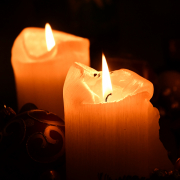How Do I Grieve During The Holiday Season?
The holidays can be bittersweet if you’ve just recently celebrated the funeral services of a loved one. In fact, even if the funeral ceremonies happened a decade ago, you can still feel melancholic during the holiday season because of a noticeably empty seat.
Your feelings are normal because holiday festivities are a time for family and friends to gather together and celebrate. However, for those mourning the loss of a loved one, the celebration can feel somewhat hollow. Whether the loss happened a few days ago or in a not-so-distant past, it is natural to experience swells of grief during the holiday rush.
Reunions and celebrations can make you feel overwhelmed, especially since you have to establish new traditions after the death of a loved one. It may make you miss them even more. Some people even feel guilty in their merry-making.
If you are in this situation, here’s what you can do to gracefully handle and celebrate the holidays without your loved ones:
Remind Yourself the Grief is Different For Each Person
Grief is a process, and it manifests differently for everyone. Experts say there are 5 stages of grief, namely: denial, anger, bargaining, sadness, and acceptance. Some people go through all stages, while others skip certain parts. You also don’t necessarily have to go through those stages in exact order. Don’t compare yourself to other people because grief is different for everyone.
Remind yourself that grief is a vital part of the healing process, so allow yourself to go through your emotions. Stay attuned to your feelings, and don’t numb them with alcohol, drugs, or other things. For example, if you don’t feel like attending a big party and feel more comfortable with intimate dinners, verbalize your thoughts. Your family and friends would most likely be willing to make adjustments for you, especially since you’re going through a trying time.
Focus on Things That You Can Control
If you have intense feelings of grief during the holiday, you must learn to be comfortable with saying no. Should certain holiday traditions feel too difficult to partake in, you can opt to sit things out. Setting healthy boundaries to protect your peace is paramount. Prioritize your well-being and decline graciously. To begin with, you cannot please everyone.
Learn to focus on things that you can control, such as planning gifts for your close friends and family or decorating your house. You set the tempo for your own life. Besides, other people will go on with their own joyous traditions. If you do end up attending certain events, plan ahead of time. Make sure you have a ready escape plan if things become too heavy for you to bear.
Find Ways to Honor Your Loved One’s Memories
Some people may have gone ahead of you, but they are certainly not forgotten. Your loved ones in heaven will understand if you create new traditions as a way to make peace without their presence. Remember, the deceased will find it difficult to rest in peace if you live in perpetual sadness.
Instead, make plans with close friends and families so you can share holiday memories together. There are many things you can do such as:
- Making memory books
- Cooking your loved ones favorite dishes
- Decorating the tree with picture ornaments
- Singing holiday carols around a memory candle
- Watching the favorite movies of your loved one
- Visiting restaurants or cafes you frequented in the past
- Listening to a playlist of your loved one’s favorite songs
Consider Sharing Your Time With Other People
If grief weighs heavily in your heart, you may consider doing something kind for others. Often, empathizing with others in need will shift your perspective. It can open up your eyes and make you realize your blessings. Although nothing can take away the pain of losing your loved one, opening your heart to volunteering can help you manage your grief. For example, you can try the following:
- Volunteering in a nursing home
- Donating gifts to the orphanage
- Cooking for a soup kitchen
- Spending time with the sick in hospitals
Even something as simple as giving a meal to a family in need can help you deal with your grief during the holidays. And if you have unrelenting feelings of sadness, don’t be afraid to ask for help from a counselor. Grief is a journey with no specific timeline of conclusion. Your feelings naturally ebb and flow like waves because you never stop loving and missing a person who’s dear to you.
Many people feel this way because the onset of the holidays brings an onslaught of memories. That can be truly hard for anyone who has lost someone. Holiday celebrations remind you of what once was and what could have been. And it’s perfectly alright to feel the blues. But remember, don’t forget to reach out to supportive family and friends because no one should feel alone during the holidays.







